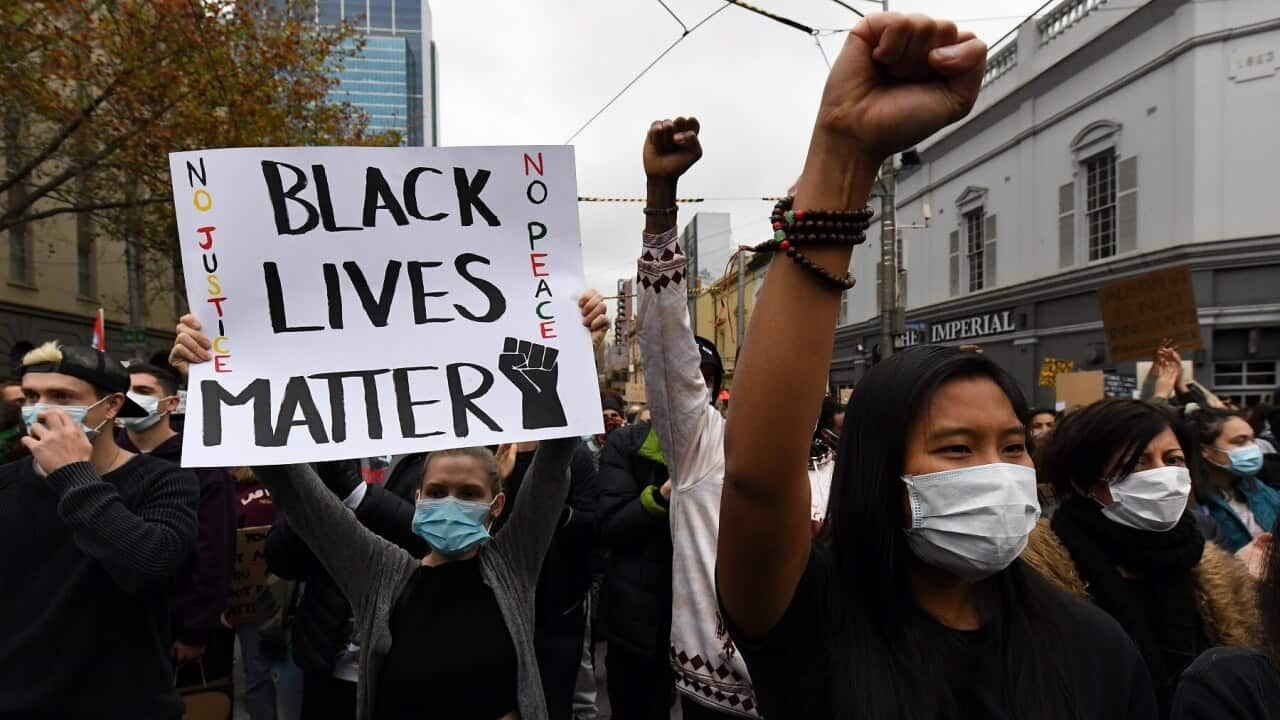In the past 12 days, more than 25,000 Australians have donated more than $1.5 million to Indigenous rights campaigns on crowdfunding site GoFundMe.
It is just one of many avenues that have been flooded with donations and support amid Black Lives Matter rallies across the world, including in Australia.
Indigenous-led advocacy groups and not-for-profit organisations across the country say they have been overwhelmed with calls, comments, emails, follows and donations - from prospective volunteers and partnership opportunities to messages of gratitude and solidarity.
“[Messages have] increased about 500 per cent,” said Kaytetye woman Rona Glynn-McDonald, founder of the not-for-profit First Nations educational organisation Common Ground.
“The inbox is constantly blowing up. Lots of people saying thank you, but also people are hungry, hungry for more knowledge,” she told SBS News. Since the murder of US man George Floyd accelerated the Black Lives Matter movement in Australia, practical ways of supporting black and Indigenous communities have been shared across social media. They include links to payment portals and suggestions of Indigenous-run accounts to follow, as well as books to read and films to watch.
Since the murder of US man George Floyd accelerated the Black Lives Matter movement in Australia, practical ways of supporting black and Indigenous communities have been shared across social media. They include links to payment portals and suggestions of Indigenous-run accounts to follow, as well as books to read and films to watch.

Rona Glynn-McDonald, founder of Common Ground, has seen a surge in donations. Source: Supplied
In the past fortnight, Common Ground raised almost $30,000 and its Instagram following ballooned from 10,000 to 47,000.
In the same period, Instagram initiative Tiddas 4 Tiddas, which shares the stories of Indigenous women and opportunities for them, jumped from 35,000 followers to more than 57,000. Blak Business, which brings together initiatives in Aboriginal & Torres Strait Islander communities, grew to 65,000 followers, from 45,000 in May. Not-for-profit Indigenous-owned fashion brand Clothing the Gap gained 14,000 followers between 3 and 10 June alone.
“I owe it all to the people who shared my content. That has the greatest impact,” said Blak Business founder and Koori woman Olivia Williams.
For Ms Glynn-McDonald, the numbers signify a growing interest in First Nations cultures and histories.
“A lot of people are joining this conversation only now around how our black communities across Australia and the globe are affected by racism and police brutality, so that has eventuated in a huge critical mass of Australians coming to us now for education and learning resources,” she said.
“It’s been incredibly heartwarming to see the numbers of people standing up who haven’t stood in solidarity for this movement before.”
While the use of social media to campaign against racism and black deaths in custody has been met with some criticism of tokenism or , including from Deputy Prime Minister Michael McCormack who on Wednesday said politicians who marched “did it for their Instagram moments,” social media has also provoked real action.
Since 25 May, a GoFundMe page supporting David Dungay Jr’s mother Leetona’s campaign for justice for his death in Sydney police custody in 2015 has grown from just $3,800 and less than 100 donations, to $470,000 from 12,500 donations from over 30 countries.
Similarly, the family of Tanya Day raised over $110,000 from 3,100 donations to seek justice for her death in custody in Victoria in 2017, and more than $185,000 was added to the fund for an independent inquiry into 19-year-old Kumanjayi Walker’s death after he was shot by police in the Northern Territory in 2019. Each page has received thousands of shares. “People are definitely listening now and we can feel the shift,” said Carly Stanley, a Wiradjuri woman and the CEO and co-founder of justice services group Deadly Connections.
“People are definitely listening now and we can feel the shift,” said Carly Stanley, a Wiradjuri woman and the CEO and co-founder of justice services group Deadly Connections.

Co-founders of Deadly Connections, Keenan Mundine and Carly Stanley. Source: Supplied
And with more protests planned in Australia this week, groups are calling for the momentum to continue and for people to act on their donation.
Ms Glynn-McDonald says of the money Common Ground has raised, the majority was from one-off donations. Very few recurring contributions were set up.
“A donation’s only the beginning of the journey of reconciling in terms of what’s happening in Australia,” she said.
"It’d be interesting to see if [one-off donations are] the same across other organisations or if it’s a conversation we need to have with Australia around what does it actually look like to support in an ongoing capacity?"
“We can’t do anything if we don’t have anything,” said Ms Stanley, whose organisation has projects “sitting on the shelf” waiting for resources.
“This is our life. We are exhausted, but we’re not going to stop because we don’t have a choice.”
Aleksandra Bliszczyk is a freelance writer based in Melbourne











